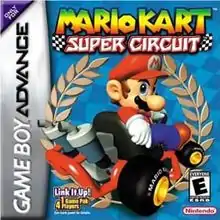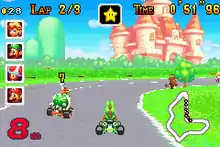Mario Kart: Super Circuit
Mario Kart: Super Circuit[lower-alpha 1] is a 2001 kart racing video game developed by Intelligent Systems and published by Nintendo for the Game Boy Advance. The game is the third installment in the Mario Kart series and the first for handhelds, following Super Mario Kart (1992) and Mario Kart 64 (1996). It was succeeded by the console game Mario Kart: Double Dash, which was released for the GameCube in 2003. The game retains traditional game elements of Mario Kart set by its predecessors, and received critical acclaim upon release.[1]
| Mario Kart: Super Circuit | |
|---|---|
 North American box art | |
| Developer(s) | Intelligent Systems Co., Ltd. |
| Publisher(s) | Nintendo |
| Director(s) | Takeshi Ando Yukio Morimoto |
| Producer(s) | Shigeru Miyamoto Kenji Miki |
| Composer(s) | Kenichi Nishimaki Masanobu Matsunaga Minako Hamano |
| Series | Mario Kart |
| Platform(s) | Game Boy Advance |
| Release | |
| Genre(s) | Kart racing |
| Mode(s) | Single-player, multiplayer |
Gameplay

Super Circuit is a kart racing video game in which the player races in a kart against other teams in different courses. The game screen indicates the current standings in a race, the number of laps needed to finish and incoming weapons. Like in the previous installments, players can pick up item boxes to receive a randomly selected item and use it to impede the opposition and gain the advantage. Some items, such as shells and banana peels, allow the player to hit others to slow them down, while other items, such as the star power-up, render them temporarily invincible to attacks. This is the second Mario Kart game to include coins, which increases the engine power of the karts.
Game modes
There are five game modes in Super Circuit: Mario GP, Time Trial, Quick Run, VS., and Battle. Most of the modes can be played by themselves in single-player races, while some can be played in multiplayer.
- Mario GP – This mode has the player compete against 7 karts (6 in 2 player races), which are controlled by the computer, in a series of predetermined courses. The player can choose to race using three different engine size classes: 50cc, 100cc, and 150cc. Since all karts go faster when using higher engine sizes, the three classes serve as difficulty levels. There are 20 tracks, divided into five cups: Mushroom, Flower, Lightning, Star, and Special. After the player crosses the finish line, the positions of the computer-controlled characters are immediately locked in and they are given points based on those positions, ranging from zero to nine; in addition, the finishing order gets carried over to the next race as the new starting grid. Just like in the previous two installments, placing fifth or worse at the end will give a "rank out" and the race must be replayed until the player placed fourth or better. Like with the first Mario Kart game, the player is given three flags; ranking out with no flags remaining will cause the game to be over. At the end of the cup, there will be an award ceremony for the top three drivers, where they will get a bronze, silver, or gold trophy and in addition, they will get a ranking based on their performance ranging from E to a triple-star. Collecting 100 coins in each of these cups will allow players to unlock all 20 tracks from Super Mario Kart known as the Extra Cups.
- Time Trial – This single-player mode has the player to finish any of the forty courses in the fastest time possible, with the best time being saved as a ghost, a copy of the player's performance that they can race against in later runs. Each character will receive a Triple Mushroom, which can be used at any time during the run.
- Quick Run – In this single-player mode, players can choose any course with customized rules such as changing the item frequency or the number of laps in each race between three and five.
- VS. – In this multiplayer mode, up to 4 players can play this mode by using a single cartridge.
- Battle – In battle mode, the player fights against up to three human-controlled opponents using items scattered throughout a battle arena. There is the traditional balloon-popping battle game, in which the player must use items to pop an opponent's three balloons while defending their own.
Characters
Super Circuit features the same cast of playable drivers as in the previous installment, each placed in one of three weight classes. Peach, Yoshi, and Toad are light, Mario and Luigi are medium, and Bowser, Donkey Kong, and Wario are heavy. In addition to the playable drivers, other characters have supporting roles in this game as well. Lakitu reprises his role as the referee, helping racers in various situations such as announcing laps, giving the signal to drive with a traffic light hanging on his fishing pole, and taking characters back on track in case they fall off course. Other supporting characters appearing in Super Circuit include Shy Guys, Piranha Plants, Boos and more.
Development
Mario Kart: Super Circuit was developed by Intelligent Systems and published by Nintendo.[2] Super Circuit was first announced in a press release by Nintendo on August 9, 2000 under the title Mario Kart Advance.[3]
Reception
| Aggregator | Score |
|---|---|
| GameRankings | 91.54%[4] |
| Metacritic | 93/100[5] |
| Publication | Score |
|---|---|
| EGM | 8.5/10[4] |
| Eurogamer | 9/10[6] |
| Famitsu | 34/40[7] |
| Game Informer | 9.5/10[4] |
| GamePro | |
| GameSpot | 8.2/10[8] |
| GameSpy | 96/100[9] |
| IGN | 9.5/10[10] |
| Nintendo Power |
| Publication | Award |
|---|---|
| IGN Editors' Choice Award[11] |
Mario Kart: Super Circuit has received critical acclaim. In 2007, IGN named Super Circuit as the 19th best game on the Game Boy Advance.[12]
In the United States, Super Circuit sold 2.1 million copies and earned $63 million by August 2006. During the period between January 2000 and August 2006, it was the fourth highest-selling game launched for the Game Boy Advance, Nintendo DS, or PlayStation Portable in that country.[13] Mario Kart: Super Circuit has sold over 2.53 million in the United States alone, placing it onto Nintendo's Player's Choice list.[14][15] It received a "Platinum" sales award from the Entertainment and Leisure Software Publishers Association (ELSPA),[16] indicating sales of at least 300,000 copies in the United Kingdom.[17] The game has sold 5.91 million copies worldwide, making it the fourth best-selling game on Game Boy Advance and the best selling non-Pokémon game for the Game Boy Advance.[18]
Re-release
On July 28, 2011, Nintendo announced that Mario Kart: Super Circuit, as well as nine other Game Boy Advance games, will be available to limited Nintendo 3DS owners, via Virtual Console, to whom will participate in the Ambassador Program after Nintendo officially issued a price-cut to the Nintendo 3DS starting August 12, 2011. This offer was available in all territories, and only to those who became eligible in the Ambassador program (by accessing the Nintendo eShop before the date of the price-cut).[19]
It was later available for purchase for the Wii U Virtual Console in North America on November 13, 2014,[20] April 23, 2015 in Europe,[21] April 24, 2015 in Australia, and July 22, 2015 in Japan.[22]
References
- Harris, Craig (August 29, 2001), "Mario Kart Super Circuit", IGN, retrieved 2020-07-03
- Intelligent Systems Co., Ltd. (11 August 2001). Mario Kart: Super Circuit. Nintendo of America, Inc. Scene: staff credits.
- IGN Staff (August 9, 2000). "Four GBA Games Exposed". IGN. Retrieved July 6, 2014.
- "Mario Kart Super Circuit Reviews". GameRankings. Retrieved 2008-04-28.
- "Mario Kart Super Circuit (gba: 2001): Reviews". Metacritic. Retrieved 2008-04-28.
- Bramwell, Tom (2001-09-27). "Mario Kart: Super Circuit Review // GBA /// Eurogamer". Eurogamer. Retrieved 2008-04-28.
- ゲームボーイアドバンス - マリオカート アドバンス. Weekly Famitsu. No.915 Pt.2. Pg.114. 30 June 2006.
- Ajami, Amer (2001-08-27). "Mario Kart Super Circuit for Game Boy Advance Review - Game Boy Advance Mario Kart Super Circuit Review". GameSpot. Retrieved 2008-04-28.
- Bub, Andrew. "GameSpy.com — Reviews: Mario Kart: Super Circuit (GBA)". GameSpy. pp. 1–2. Archived from the original on 2008-08-03. Retrieved 2008-04-28.
- Harris, Craig (2001-08-29). "IGN: Mario Kart Super Circuit Review". IGN. Retrieved 2008-04-28.
- "IGN Editors' Choice Games". IGN. Archived from the original on 2005-12-12. Retrieved 2008-04-23.
- Harris, Craig. "Top 25 Game Boy Advance Games of All Time". IGN. March 25, 2007. Accessed April 11, 2008.
- Keiser, Joe (August 2, 2006). "The Century's Top 50 Handheld Games". Next Generation. Archived from the original on October 10, 2007.
- "The Magic Box — US Platinum Chart Games". The Magic Box. 2007-12-27. Retrieved 2008-04-28.
- Harris, Craig (2006-07-27). "IGN: Player's Choice, Round Two". IGN. Retrieved 2008-04-28.
- "ELSPA Sales Awards: Platinum". Entertainment and Leisure Software Publishers Association. Archived from the original on May 15, 2009.
- Caoili, Eric (November 26, 2008). "ELSPA: Wii Fit, Mario Kart Reach Diamond Status In UK". Gamasutra. Archived from the original on September 18, 2017.
- Futter, Mike (2 June 2014). "Mario Kart 8 Speeds To Over 1.2 Million Sales In Opening Weekend". Game Informer. GameStop. Retrieved 2 June 2014.
- Life, Nintendo (2011-07-31). "FAQ: Nintendo Ambassador Program and Free eShop Games". Nintendo Life. Retrieved 2020-07-03.
- "Mario Kart: Super Circuit". Nintendo.com. November 13, 2014. Retrieved October 24, 2020.
- "Mario Kart: Super Circuit". Nintendo.co.uk. April 23, 2015. Retrieved October 24, 2020.
- "Mario Kart Advance". Nintendo.co.jp. July 22, 2015. Retrieved October 24, 2020.